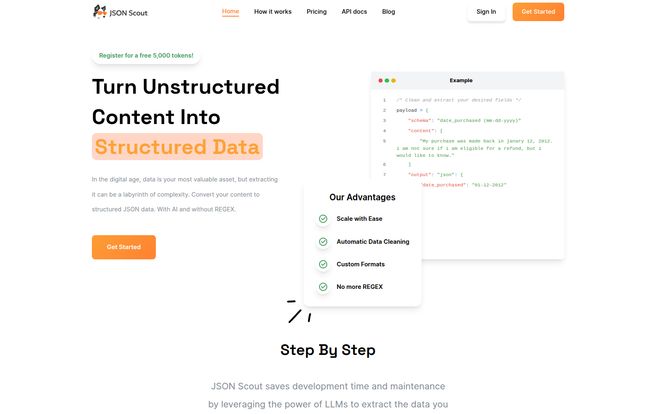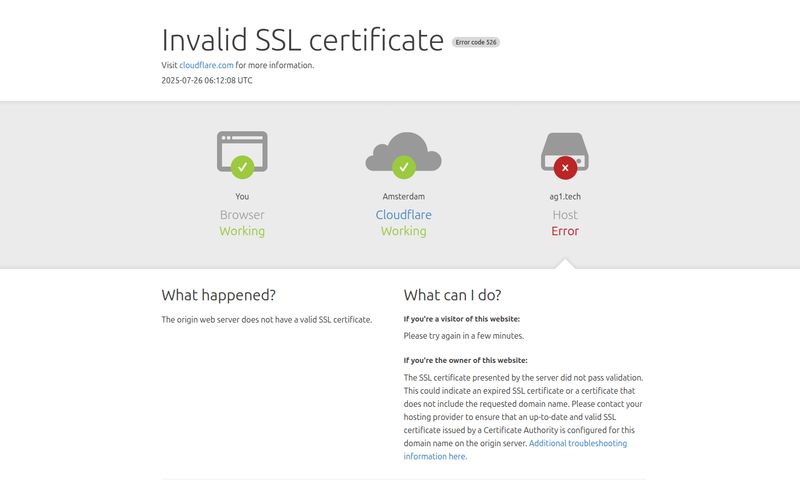If you’ve ever worked with data, you’ve probably had a day (or week) ruined by REGEX. You know, Regular Expressions. That cryptic, arcane language of slashes, brackets, and asterisks that’s supposed to be the master key for finding needles in a haystack of text.
I’ve been there. Staring at a screen, chugging my third coffee, wondering why my supposedly “perfect” pattern for extracting email addresses from a messy block of text is pulling everything but the email addresses. It’s a rite of passage, I guess, but it’s one I’d gladly skip. It feels like trying to perform brain surgery with a pair of gardening shears. Sometimes it works, but it's always messy, and you’re one tiny mistake away from a disaster.
So, when I stumbled upon a tool called JSON Scout, which promised to do all that heavy lifting with AI and no REGEX, my ears perked up. Skeptical? Absolutely. Hopeful? You bet. I had to see for myself if this was the real deal or just another fancy tech demo.

Visit JSON Scout
So, What Exactly is JSON Scout?
At its core, JSON Scout is an AI-powered tool that turns messy, unstructured text into clean, organized JSON data. Think of it like a brilliant translator. You give it a chaotic paragraph—a customer review, a log file, a transcribed audio clip—and you tell it what you want. Not with complex patterns, but with simple instructions. “I want the customer’s name, the date of purchase, and their overall sentiment.”
Instead of you meticulously building a cage (REGEX) to trap the data, JSON Scout is like a trained data-retriever. It reads the text, understands the context, and brings back exactly what you asked for, neatly packaged in a JSON object. It gets that “Jan. 12, 2024” and “January 12th” are the same thing. It doesn’t freak out over a typo. It’s just… smarter.
The Old Way vs. The JSON Scout Way
The difference is night and day. Let's paint a picture. For years, if I wanted to pull dates from user feedback, my Python script would look something like this:
# The Old, Painful Method
import re, datetime
content = "My purchase was made back in january 12, 2012. I am not sure if I am eligible for a refund, but I would like to know."
# Create the REGEX pattern... pray it works
date_pattern = r'[a-zA-Z]+\s\d{1,2},\s\d{4}'
# Search and hope for the best
match = re.search(date_pattern, content)
# ... and then you still have to format it And that’s a simple example. It doesn't account for different date formats, misspellings, or anything else the real world throws at you. Every new variation means updating the REGEX. It's a never-ending cycle of patching and praying.
Enter the New Method
With JSON Scout, the approach is fundamentally different. You’re not writing rules; you’re stating a goal. You just define the schema you want, and send the content over via their API.
# The New, Blissful Method with JSON Scout
import requests, json
payload = {
"schema": "date_purchased (mm-dd-yyyy)",
"content": "My purchase was made back in january 12, 2012..."
}
response = requests.request(...) # API call to JSON Scout
# The output? Clean JSON. Done. That's it. No complicated patterns. You just told it you wanted a date in a specific format, and the AI, powered by models like GPT-4o, handles the rest. It’s a massive shift from being a pattern-matcher to a meaning-extractor.
Why This Is a Bigger Deal Than It Looks
This isn't just about saving a few lines of code. It’s about changing how we approach data problems.
- It saves an insane amount of time. The hours I’ve personally spent writing, debugging, and maintaining REGEX could probably be measured in weeks. That’s time that could have been spent on actual analysis and strategy, not just data janitor work.
- It's more accurate. Because it understands context and semantics, it handles variations and typos that would completely break a rigid REGEX pattern. This means cleaner data from the get-go.
- It’s future-proof. As your data sources change or evolve, you don’t have to rewrite your extraction logic from scratch. The AI adapts. This is huge for long-term projects and scaling operations.
And for those of us working with APIs, JSON Scout offers easy integration for Python, Node.js, or whatever language you fancy. The batch processing feature is also a nice touch for anyone dealing with larger volumes of data at once.
Alright, Let's Talk Money: JSON Scout Pricing
So, what’s the damage? I was actually pleasantly surprised by their pricing structure. It seems designed to let you grow into it, which I appreciate. They have both monthly and annual plans, with a discount on annual.
| Plan | Price (Monthly) | Key Features & Limits | Who It's For |
|---|---|---|---|
| FREE | $0 / Month | 5,000 Tokens, 250 Character Limit, Text & Audio Extraction | Hobbyists, students, or anyone wanting to test the waters. It's surprisingly generous for a free tier. |
| STARTER | $9 / Month | 500,000 Tokens, 500 Character Limit, Basic Email Support | Freelancers or small projects with moderate data needs. This is the sweet spot for getting serious work done without a big commitment. |
| STANDARD | $99 / Month | 10,000,000 Tokens, 500 Character Limit, 100 Batch Limit | Small businesses, startups, or teams that rely heavily on data extraction. The token count is substantial here. |
| ENTERPRISE | Contact Sales | Custom Tokens, No Limits, Priority Support, Integration Help | The big leagues. Large organizations with massive data pipelines and specific needs. |
A quick note on tokens: Tokens are basically pieces of words. 1,000 tokens is about 750 words. The limits seem fair, but if you're processing novels, you'll want to keep an eye on your usage.
The Potential Downsides
No tool is perfect, right? It's important to be realistic. The main constraint here is, of course, the token and character limits on the lower-tier plans. If you have a massive, continuous firehose of data, you'll either need the Enterprise plan or have to be strategic about what you process. The cost could add up for extremely high-volume use cases.
For most people, though—especially those of us escaping the REGEX nightmare for sentiment analysis, data entry automation, or scraping projects—the limits on teh paid plans are pretty reasonable.
Frequently Asked Questions about JSON Scout
How does it know what data to pull out?
You tell it! But you do it in plain English. In your API call, you define a “schema” that describes what you're looking for, like 'product_name' or 'date_of_complaint'. The AI then reads your content and finds the information that matches that description.
Can I specify the output format?
Yes, and this is one of my favorite parts. You can specify the exact format in your schema. For instance, you can tell it to return dates as 'MM-DD-YYYY' or 'Day, Month Date, Year', and it will handle the conversion for you. Super handy.
What happens if I go over my token limit?
Based on their model, once you hit your limit for the month, you'll likely need to wait until the next billing cycle for it to reset or upgrade your plan. It’s pretty standard practice for services like this. Always best to start on a plan that gives you a little buffer.
Is it just for text?
Nope! A really cool feature is that it also supports audio data extraction. You can feed it an audio file, and it will transcribe and extract the structured data from the spoken words. Think call center recordings or voice memos. That opens up a whole new world of possibilities.
My Final Verdict: Is JSON Scout a Keeper?
After playing around with JSON Scout for a while, I’m genuinely impressed. It’s not just a tool; it's a fundamental improvement to a broken process. For developers, data analysts, and anyone who has ever cursed at a REGEX pattern, this feels like a breath of fresh air.
Is it for everyone? If your data is already perfectly structured, then maybe not. But for the 99% of us dealing with the messy reality of human-generated content, customer feedback, and varied data sources, JSON Scout is an incredibly powerful ally. It saves time, reduces frustration, and frankly, it just works.
I'm officially hanging up my REGEX hat for most of my extraction tasks. The dolphin is just better at catching fish than my leaky, square net ever was.



